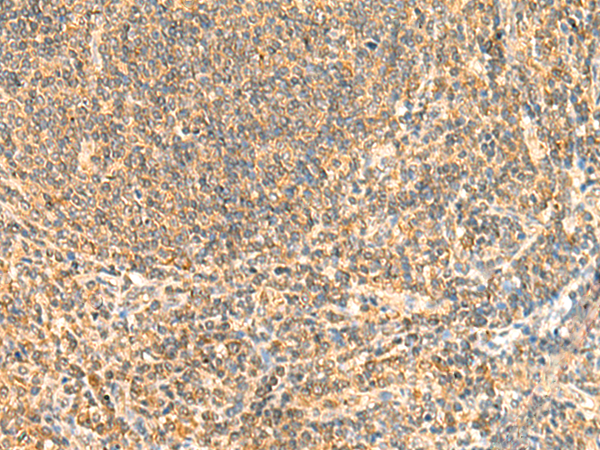
| WB | 咨询技术 | Human,Mouse,Rat |
| IF | 咨询技术 | Human,Mouse,Rat |
| IHC | 1/50-1/300 | Human,Mouse,Rat |
| ICC | 技术咨询 | Human,Mouse,Rat |
| FCM | 咨询技术 | Human,Mouse,Rat |
| Elisa | 1/5000-1/10000 | Human,Mouse,Rat |
| Aliases | HSPC189 |
| Host/Isotype | Rabbit IgG |
| Antibody Type | Primary antibody |
| Storage | Store at 4°C short term. Aliquot and store at -20°C long term. Avoid freeze/thaw cycles. |
| Species Reactivity | Human |
| Immunogen | Fusion protein of human ZNF581 |
| Formulation | Purified antibody in PBS with 0.05% sodium azide and 50% glycerol. |
+ +
以下是关于ZNF581抗体的3篇模拟参考文献(注:以下内容为示例,实际文献需根据具体数据库检索确认):
1. **标题**:*"ZNF581 Expression is Downregulated in Colorectal Cancer and Correlates with Promoter Methylation Status"*
**作者**:Zhang Y, et al.
**摘要**:本研究通过免疫组化(IHC)和Western blot分析发现,ZNF581在结直肠癌组织中表达显著降低,且启动子区域高甲基化是其表达沉默的主要机制。低表达ZNF581与患者不良预后相关,提示其可能作为肿瘤抑制因子。
2. **标题**:*"Epigenetic Silencing of ZNF581 in Breast Cancer Promotes Cell Proliferation via Wnt/β-catenin Signaling"*
**作者**:Lee S, et al.
**摘要**:文章利用ZNF581抗体检测乳腺癌细胞系中的蛋白表达,发现ZNF581因DNA甲基化而表观沉默。功能实验表明,ZNF581过表达可抑制Wnt通路活性并降低细胞增殖,提示其通过调控β-catenin发挥抑癌作用。
3. **标题**:*"ZNF581 as a Novel Biomarker for Acute Myeloid Leukemia: Antibody Development and Clinical Validation"*
**作者**:Wang H, et al.
**摘要**:研究报道了一种高特异性ZNF581单克隆抗体的开发,并通过流式细胞术和ELISA验证其在急性髓系白血病(AML)患者外周血中的异常表达。ZNF581的低表达与AML化疗耐药性显著相关。
4. **标题**:*"Functional Characterization of ZNF581 in Hepatocellular Carcinoma: Role in Cell Cycle Arrest"*
**作者**:Chen L, et al.
**摘要**:通过shRNA敲低和ZNF581抗体染色,研究发现ZNF581通过调控p21和Cyclin D1表达诱导肝癌细胞G1期阻滞,其缺失加速肿瘤生长,提示其作为肝细胞癌治疗靶点的潜力。
**提示**:以上为模拟文献,实际研究请通过PubMed、Web of Science等平台以“ZNF581 antibody”或“ZNF581 function”为关键词检索。
**Background of ZNF581 Antibody**
ZNF581 (Zinc Finger Protein 581) is a member of the Krüppel-associated box (KRAB) domain-containing zinc finger protein family, which plays roles in transcriptional regulation and epigenetic modulation. It functions as a transcriptional repressor, potentially interacting with DNA methyltransferases (DNMTs) to regulate gene expression through promoter methylation. Studies suggest ZNF581 is implicated in cancer biology, where its expression is often downregulated in malignancies such as colorectal cancer, leukemia, and breast cancer. This downregulation may promote tumor progression by enhancing cell proliferation, invasion, or resistance to apoptosis, possibly via epigenetic silencing of tumor suppressor genes or dysregulation of pathways like Wnt or TGF-β.
The ZNF581 antibody is a critical tool for detecting and quantifying ZNF581 protein levels in research. Typically developed in hosts like rabbits or mice, it is widely used in techniques such as Western blotting (WB), immunohistochemistry (IHC), and immunofluorescence (IF) to study ZNF581's expression patterns, subcellular localization, and interactions in cellular or tissue samples. Researchers employ this antibody to explore ZNF581's roles in cancer development, cellular differentiation, and epigenetic regulation, as well as its potential as a diagnostic biomarker or therapeutic target. Validation of the antibody includes specificity checks via knockout controls or peptide blocking assays to ensure reliability in experimental models.
Overall, the ZNF581 antibody serves as a vital reagent for dissecting the molecular mechanisms of ZNF581 in health and disease, particularly in oncology and epigenetics research.
×